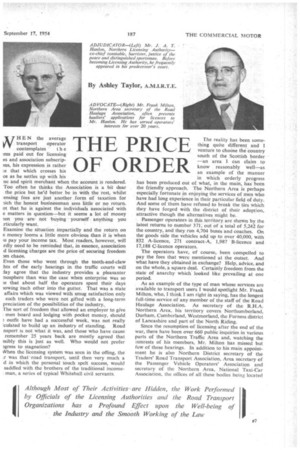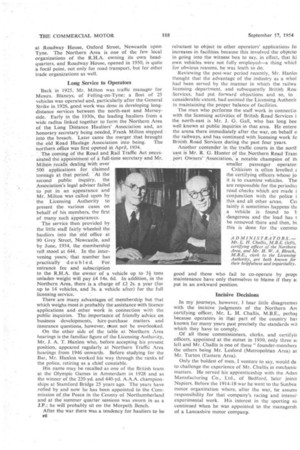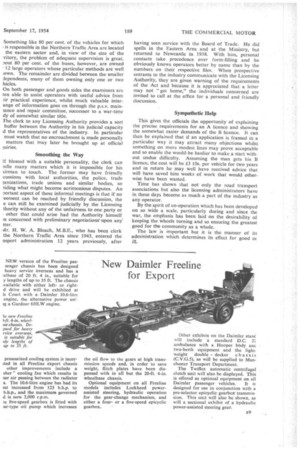THE PRICE OF ORDER
Page 97

Page 98

Page 99

If you've noticed an error in this article please click here to report it so we can fix it.
By Ashley Taylor, A.M.I.R.T.E.
HEN the average transport operator contemplates t h e :ms paid out for licensing es and association subscripms, his expression is rather :e that which crosses his ce as he settles up with his ne and spirit merchant when the account is rendered. Too often he thinks the Association is a bit dear the price but he'd better be in with the rest, whilst .easing fees are just another form of taxation for -ilch the honest businessman sees little or no return. ot that he is against the individuals associated with e matters in question—but it seems a lot of money ten you are• not buying yourself anything you sticularly want.
Examine the situation impartially and the return on e money looms a little more obvious than it is when u pay your income tax. Most readers, however, will rdly need to be reminded that, in essence, association d licenSing charges are the price of securing freedom am chaos.
Even those who went through the tooth-and-claw hts of the early hearings in the traffic courts will Jay agree that the industry provides a pleasanter nosphere than was the case when enterprise was so :e that about half the operators spent their days )(awing each other into the gutter. That was a state affairs which was viewed with smug satisfaction only such traders who were not gifted with a long-term preciation of the possibilities of the industry.
The sort of freedom that allowed an employer to give men board and lodging with pocket money, should outfit have had a successful week, was not really Culated to build up an industry of standing. Road nsport is not what it was, and those who have cause remember 25 years back are mostly agreed that ssibly this is just as well. Who would not prefer )gress to stagnation?
When the licensing system was seen in the offing, the .r was that road transport, until then very much a d in which the personal touch spelt success, would saddled with the brothers of the traditional incomeman, a series of typical Whitehall civil servants. The reality has been something quite different. and I venture to choose the country south of the Scottish border —an area I can claim to know reasonably well—as an example of the manner in which orderly progress has been produced out of what, in the main, has been the friendly approach. The Northern Area is perhaps especially fortunate in enjoying the services of men who have had long experience in their particular field of duty. And some of them have refused to break the ties which they have forged with the district of their adoption, attractive though the alternatives might be.
Passenger operators in this territory are shown by the latest returns to number 371, out of a total of 5,242 for the country, and they run 4,704 buses and coaches. On the goods side the vehicles add up to over 40,000, with 832 A-licence, 271 contract-A, 1,987 B-licence and 17,188 C-licence operators.
The operators have, of course, been compelled to pay the fees that were mentioned at the outset. And what have they obtained in exchange? Help, advice, and on the whole, a square deal. Certainly freedom from the state of anarchy which looked like prevailing at one period.
• As an example of the type of man whose services are available to transport users I would spotlight Mr. Frank Milton, who, I think I am right in saying, has the longest full-time service of any member of the staff of the Road Haulage Association. As secretary of the R.H.A. Northern Area, his territory covers Northumberland, Durham, Cumberland, Westmorland, the Furness district of Lancashire and part of the North Riding.
Since the resumption of licensing after the end of the war, there have been over 660 public inquiries in various parts of the Northern Traffic Area and, watching the interests of his members, Mr. Milton has missed but few of these hearings. In addition to his main appointment he is also Northern District secretary of the Traders' Road Transport Association, Area secretary of the Passenger Vehicle Operators' Association and secretary of the Northern Area, National Taxi-Car Association, the offices of all these bodies being located at Roadway House, Oxford Street, Newcastle upon Tyne. The Northern Area is. one of the few local organizations of the R.H.A. owning its own headquarters, and Roadway House, opened in 1950, is quite a focal point, not only for road transport,but for other trade organizations as welt.
Long Service to Operators
Back in 1925, Mr. Milton was traffic manager for Messrs. Blaneys, of Felling-on-Tyne; a fleet of 25 vehicles was operated arid, particularly after the General Strike in 1926, good work was done in developing longdistance services between the north-east and Merseyside. Early in the 1930s, the leading hauliers from a wide radius linked together to form the Northern Area of the Long Distance . Hauliers' Association and,, an honorary secretary being needed, Frank Milton stepped into the breach. Later came the merger that brought
the old Road Haulage Association. into being. The -northern office was first .opened in April, 1934.
The coming of the Road and Rail Traffic Act neces7
sitated the appointment of a full-time secretary and Mr. , . Milton recalti dealing with over 500 applications for 'claimed tonria.ke at that period. At the second public ,inquiry, the Assaciatioa's legal adviser failed to put in an appearance and Mr. Milton was called upon by the Licensing Authority to present the various cases on behalf of his members, the first of many such appearances.
• The service then. provided by the little staff fairly wheeled the hauliers into the ' old office. at 90 Grey Street, Newcastle, and by June, 1934, the membership roll .stood at 644. In the intervening years, • that number has practic.ally d ou b led. For entrance fee and subscription to the R.H.A. the owner of a vehicle up to 3i tons unladen weight will pay £4 14s. 6d. In addition, in the Northern -Area, 'there is a charge of £2 2s. a year (for up to 14 vehicles, and 3s. a vehicle after) for the full
licensing service. • There :are many advantages of membership but that which weighs most is probably the assistance with licence applications and other work in connection with the public inquiries. The importance of friendly advice on business developments, lire-purchase matters and insurance questions, however, must not be overlooked.
On the other side of the table at Northern Area hearings is the familiar figure of the Licensing Authority, Mr. I. A. T. Hanlon who, before accepting his present position, appeared regularly at Northern Traffic Area hearings from 1946 onwards. Before studying for the Bar, Mr. Hanlon worked his way through the ranks df the police, retiring as a chief constable.
His name may be recalled as one of the British team at the Olympic Games in Amsterdam in 1928 and as the winner of the 220-yd. and 440-yd. A.A.A. championships at Stamford Bridge 25 years ago. The years have rolled by and now he has been .appointed to the Commission of the Peace in the County of Northumberland and at the summer quarter sessions was sworn in as a J.P.; he will probably sit on the Morpeth Bench.
After the war there was a tendency for hauliersto be F8 reluctant to object to other operators' applications to increases in facilities because this involved the object() in going into the witness box to say, in effect, that hi own vehicles were not fully employed—a thing which for obvious reasons, he was loath to do. .
Reviewing the post-war period recently, Mr. Hanloi thought that the advantage of the industry as a whol had been served by the manner in which the railwa. licensing department, and subsequently British Row Services, had put forward objections and so, to .
considerable extent, had assisted the Licensing Authorit in maintaining the proper balance of facilities.
The man who performs the staff work in connectio with the licensing activities of British Road Services i the north-east is Mr. J. G. Gall, who has long bee well known at public inquiries in that area. He entere.
the arena there immediately after the war, on behalf o the' railways, and has continued with licensing work to British Road. Services during the past four years.
Another contender in the traffic courts in the nortL _ east is Mr. R. G. Hunter of the Northern Road Iran! _port Owners Association a _notable champion of th • smaller passenger operator: Criticism is often levelled, the certifying officers whose jo it is to examine vehicles. The are responsible for the periodici road checks which are made i conjunction with the police i this and all other areas. Cei
tainly it sometimes happens thza vehicle is found to h dangerous and the load has t
be removed there and then, hi this is done for the comma
good and those who fail to co-operate by prop( maintenance have only themselves to blame if they al put in an awkward position, Incisive Decisions
In my journeys, however, I hear little disagree= with the incisive judgments of the Northern Ail certifying officer, Mr. L. H. Challis, M.B.E., perhal because operators in that part of the country hirs known for many years past precisely the standards wil which they have to comply.
Of all those commissioners, clerks, and certifyir officers; appointed at the outset in 1930, only three a., left and Mr. Challis is one of these "founder-members the others being Mr. Lesford (Metropolitan Area) ar Mr. Turton (Eastern Area).
Only the boldest of men, I venture to say, would da to challenge the experience of Mr. Challis in mechanic matters. He served his apprenticeship with the Adan Manufacturing Co., Ltd., of Bedford, later join ii Napiers. Before the 1914-18-war he went to the Sunbea motor organization where, after the war, he assumi responsibility for that company's racing and intensi, experimental work. His interest in the sporting sis continued when he was appointed to the managersh of a Lancashire motor company.
Something like 80 per cent, of the vehicles for which : is responsible in the Northern Traffic Area are located • the eastern sector and, in view of the size of the Titory, the problem of adequate supervision is great. out 80 per cent, of the buses, however, are owned • 12 large operators whose particular methods are well Lown. The remainder are divided between the smaller dependents, many of them owning only one or two hicks.
On both passenger and goods sides the examiners are ten able to assist operators with useful advice from ir practical experience, whilst much valuable interange of information goes on through the p.s.v. mainlance and repair committee, successor to a war-time dy of somewhat similar title.
The clerk to any Licensing Authority provides a sort buffer between the Authority in his judicial capacity d the representatives of the industry. In particular must watch that no encroachment is made personally matters that May later be brought up at official iuiries.
Smoothing the Way If blessed with a suitable personality, the clerk can ridle many matters which it is impossible for his tirman to touch. The former may have friendly cussions with local authorities, the police, trade ;anizations, trade unions and similar bodies, so )iding what might become acrimonious disputes. An ?ortant aspect of these informal meetings is that if no .eement can be reached by friendly discussion, the e can still be examined judicially by the Licensing thority without any of the unfairness to one party or other that could arise had the Authority himself ;n concerned with preliminary negotiations-upon any tter.
dr. H. W. A. Bleach, M.B.E., who has been clerk the Northern Traffic Area since 1943, entered the nsport administration 12 years previously, after having seen service with the Board of Trade. He did spells in the Eastern Area and at the Ministry, but returned to Newcastle in 1938. With him, personal contacts take precedence over form-filling and he obviously knows operators better by name than by the numbers on their respective files. When prospective entrants to the industry communicate with the Licensing Authority, they are given warning of the requirements of the Act and because it is appreciated that a letter may not "get home," the individuals concerned are invited to call at the office for a personal and friendly discussion.
Sympathetic Help
This gives the officials the opportunity of explaining the precise requirements for an A licence and showing the somewhat easier demands of the B licence. It can then be explained that if an application is framed in a particular way it may attract many objections whilst something on more modest lines may prove acceptable and so enable the would-be haulier to make a-start without undue difficulty. Assuming the man gets his B licence, the cost will be £3 10s. per vehicle for two years and in return he may well have received advice that will have saved him weeks of work that would otherwise have been wasted.
Time has shown that not only the road transport associations but also the licensing administrators have in these days become as much a part of the industry as any operator.
By the spirit of co-operation which has been developed on so wide a scale, particularly during and since the war, the emphasis has been laid on the desirability of keeping the wheels turning and so ensuring the greatest good for the community as a whole.
The law is important but it is the manner of its administration which determines its effect for good or












































































































































































































